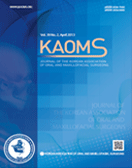Journal of the Korean Association of Oral and Maxillofacial Surgeons
- P-ISSN2234-7550
- E-ISSN2234-5930
- SCOPUS, KCI, ESCI
 ISSN : 2234-7550
ISSN : 2234-7550
Classification and surgical management of temporomandibular joint ankylosis: a review
Bhat Hari Kishore (Department of Oral and Maxillofacial Surgery, Yenepoya Dental College and Hospital, Yenepoya (Deemed to be University), Mangalore, IndiaCenter for Craniofacial Anomalies, Yenepoya (Deemed to be University), Mangalore, India)
Rao B.H. Sripathi (Yenepoya (Deemed to be University), Mangalore, India)
Reddy Srinivas Gosla (Faculty of Dentistry, All India Institute of Medical Sciences (AIIMS) Rishikesh, Rishikesh, IndiaGSR Institute of Craniofacial Surgery, Hyderabad, India)
Abstract
The paper reviews various classifications and surgical techniques for the treatment of temporomandibular joint ankylosis. PubMed, EBSCO, Web of Science, and Google Scholar were searched using a combination of keywords. Articles related to classification, resection-reconstruction of the temporomandibular joint, and management of airway obstruction were considered and categorized based on the objectives. Seventy-nine articles were selected, which included randomized clinical trials, non-randomized controlled cohort studies, and case series. Though several classifications exist, most classifications are centered on the radiographic extent of the ankylotic mass and do not include the clinical and functional parameters. Hence there is a need for a comprehensive staging system that takes into consideration the age of the patient, severity of the disease, clinical, functional, and radiographic findings. Staging the disease will help the clinician to adopt a holistic approach in treating these patients. Interpositional arthroplasty (IA) results in better maximal incisal opening compared with gap arthroplasty, with no significant difference in recurrent rates. Distraction osteogenesis (DO) is emerging as a popular technique for the restoration of symmetry and function as well as for relieving airway obstruction. IA, with a costochondral graft, is recommended in growing patients and may be combined with or preceded by DO in cases of severe airway obstruction. Alloplastic total joint replacement combined with fat grafts and simultaneous osteotomy procedures are gaining popularity. A custom-made total joint prosthesis using CAD/CAM can efficiently overcome the shortcomings of stock prostheses.
- keywords
- Temporomandibular joint, Ankylosis, Classification, Arthroplasty, Distraction osteogenesis
- Downloaded
- Viewed
- 0KCI Citations
- 0WOS Citations